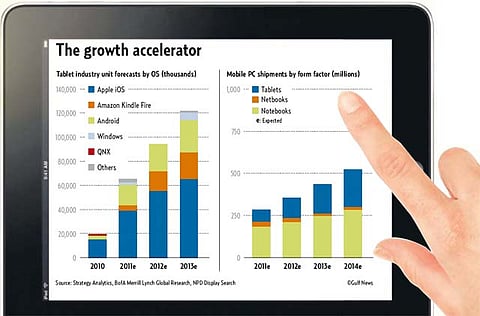A tonic of tablets to spur growth
Apple will rule the roost but non-iPads will gain significant market share

Tablets are not just here to stay — they are out to plug the gaps in the growth of other mobile computing formats.
Tablet shipments were expected to be 72.7 million units in 2011, and this is where it gets interesting, accounting for 25.5 per cent of the overall mobile PC shipments.
Notebook PC shipments were estimated at 187.5 million units for the same period, up 12 per cent year-on-year. Mini-notebooks PCs totalled another 25.2 million units, up 20 per cent year on year.
This year, tablet shipments could well cross the 100 million mark. "Tablets will be the growth accelerant in the overall mobile PC market this year as macro-economic factors and hard drive supply issues impact the notebook market," said Richard Shim, senior analyst at NPD DisplaySearch.
By 2017, while notebook PCs are forecast to reach 432 million units, tablet shipments would close the gap further and reach 383.3 million units.
Demand for tablets will continue to be driven by ever more powerful multi-core processors, mature operating systems, growing apps libraries and higher resolution panels. NPD forecasts that tablets with 250 to 300 pixel per inch panels will make up nearly 25 per cent of shipments this year. The iPhone currently has the best pixel per inch panel at 326.
It was last year the first 1280x720 pixel phone screens appeared, but according to Richard Shim, that resolution will become the new standard for high-end smartphones in 2012. "We also expect a significant bump in tablets' pixel density this year," he added.
"While the initial adoption of tablets was led by the consumer segment, 2012 will be year where tablets will be more widely adopted by enterprises. In a survey conducted by Morgan Stanley with 50 enterprise chief information officers (CIO)s, a staggering 51 per cent of companies expect to purchase tablets for its employees while 67 per cent of the companies surveyed expect either to purchase tablets or provide support for employee-owned tablets this year, Ashraf Fawakherji, general manager, Telecommunications Group, Samsung Gulf Electronics, said.
Steady growth
According to Rajnish Kautia, senior manager, IT Marketing Division, Sony Gulf, the tablet market will continue growing at a steady rate of 15-20 per cent in the region. Tablet devices are expected to contribute 20-30 per cent to the overall growth of mobile PC market in the region.
"In the GCC, consumers and enterprise users alike are rapidly adopting the new technology largely due to the tablets' thin and light form factor, powerful computing capabilities and adaptability," Fawakherji said.
Usage of tablets among regional enterprises is picking up primarily due to the growing number of powerful third-party business applications and the ability to create customised applications that cater to business' unique needs.
"Tablets are capturing a notable share of the existing netbook market, and will play a significant role in growing the PC industry due to their ease of use, affordability, and attachment level. Consumers are treating their tablets much like smartphones and far more likely to carry them around than an unwieldy laptop," Raed Hafez, managing director for Motorola Mobility, Middle East and Africa, said.
Device manufacturers are also promising enhanced colour quality, better viewing angles and lower power consumption.
If 2010 was the year for solo processors and 2011 for dual-core processors, it is logical this year will be about quad-core processors. The world's first quad-core Tegra flat Transformer Prime 3 is already in production; Apple's upcoming A6 processor is also expected to be quad-core.
Quad-cores enable computers to work more smoothly and seamlessly, while playing a game is more fluid, and it is easy on the battery life. The Android 4.0 Ice cream Sandwich will become the main OS on slates this year, while Windows 8 should get the momentum going in summer. The iPad is still the one to beat as it accounts for more than half of the tablet sales. This will continue into 2013.
The iPad 3 is due to be launched before March and likely to have a retina screen similar to the iPhone, a faster processor and the Siri virtual pronunciation assistant.
Amazon's Kindle Fire and Barnes & Nobles' Nook tablet were the new entrants into the Android space last year. Despite getting mixed notices on the market, they are cheap and have managed good performances.
Amazon and Barnes & Nobles' advantage don't stop at the price point: the companies own an entire content trove of movies, e-books, TV shows and other media. "Tablets are set to be the next big thing in mobile games, Shim said. "Their large screen size means that people can see more of the game they're playing. They typically have higher powered processors than their smartphone cousins, so not only can the user see more of the action, but what's on the screen can be far more detailed."
Expensive experimentation
According to Josh Martin, director of Apps Research at Strategy Analytics, 2011 has been a year of expensive experimentation for many publishers. "Now, many are reassessing their return on investment in tablet apps," said Martin.
"Over-designed multimedia versions of consumer magazines appear to distract readers from the core content. The majority of tablet readers seem happier with simple enhanced PDF versions of their favourite brands or layouts that emphasise the readability of the articles on their devices.
"We see immense potential in the adoption of tablets in the educational sector as research into education and educational techniques suggests a possible relationship between physical touch and learning," Fawakherji said.
Let us wait until the end of the year to see how well non-iPad tablets perform in the consumer space.



